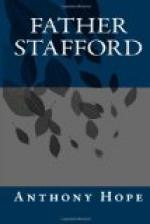Stafford left the Retreat the morning after his meeting with Morewood, feeling, he confessed to himself, as if he had taken a somewhat unfair advantage of its hospitality. The result of his sojourn there, if known to the Founder, might have been a trial of that enthusiast’s consistency to his principles, and Stafford was glad to be allowed to depart, as he had come, unquestioned. He came straight to London, and turned at once to the task of finding Claudia as soon as he could. The most likely quarter for information was, he thought, Eugene Lane or his mother; and on the afternoon of his arrival in town—on the same day, that is, as Eugene had surprised Sir Roderick at breakfast—he knocked at the door of Eugene’s house in Upper Berkeley Street, and inquired if Eugene were at home. The man told him that Mr. Lane had returned only that morning, from America, he believed, and had left the house an hour ago, on his way to Territon Park; he added that he believed Mr. Lane had received a telegram from Lord Rickmansworth inviting him to go down. Mrs. Lane was at Millstead Manor.
Stafford was annoyed at missing Eugene, but not surprised or disturbed to hear of his visit to Territon Park. Eugene did not strike him as a possible rival. It may be doubted whether in his present frame of mind he would have looked on any man’s rivalry as dangerous, but of course he was entirely ignorant of the new development of affairs, and supposed Eugene to be still the affianced husband of Miss Bernard. The only way the news affected him was by dispelling the slight hope he had entertained of finding that Claudia had already returned to London.
He went back to his hotel, wrote a single line to Eugene, asking him to tell him Claudia’s address, if he knew it, and then went for a walk in the Park to pass the restless hours away. It was a dull evening, and the earliest of the fogs had settled on the devoted city. A small drizzle of rain and the thickening blackness had cleared the place of saunterers, and Stafford, who prolonged his walk, apparently unconscious of his surroundings, had the dreary path by the Serpentine nearly to himself. As the fog grew denser and night fell, the spot became a desert, and its chill gloom began to be burdensome even to his prepossessed mind. He stopped and gazed as far as the mist let him over the water, which lay smooth and motionless, like a sheet of opaque glass; the opposite bank was shrouded from his view, and imagination allowed him to think himself standing on the shore of some almost boundless lake. Seen under such conditions, the Serpentine put off the cheerful vulgarity of its everyday aspect, and exercised over the spirit of the watcher the same fascination as a mountain tarn or some deep, quick-flowing stream. “Come hither and be at rest,” it seemed to whisper, and Stafford, responsive to the subtle invitation, for a moment felt as if to die in the thought of his mistress would be as sweet as to live




